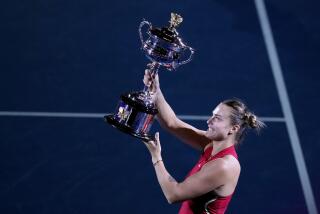Hewitt’s Hit and Run Title
- Share via
INDIAN WELLS — If you blinked, it would have been easy to miss Lleyton Hewitt dropping to his knees in celebration. This was no lingering Bjorn Borg-type emotive moment. For Hewitt, there was no basking, just briskness.
After all, it made complete sense. The top-seeded 21-year-old Australian did everything quickly Sunday in the Pacific Life Open final, where speed was the theme:
Hewitt running down nearly everything in sight, forcing Tim Henman to hit a second and even a third volley to secure a point. Hewitt running away with the first set in 28 minutes, committing only five unforced errors. Hewitt running off with his 11th consecutive win and his second title in his last two tournaments, as he defeated No. 9-seeded Henman of Britain, 6-1, 6-2, in 1 hour 21 minutes before an estimated 12,000 spectators.
It felt as though the on-court trophy ceremony lasted longer than the first set.
Actually, an overtime of the NCAA basketball tournament game seemed shorter.
“I’d like to thank you and apologize to you. I’m sorry I didn’t make it longer, but my opponent had something to do with it,” Henman told the fans.
He had plenty of company. In the tournament, Hewitt beat Carlos Moya, Jan-Michael Gambill, Thomas Enqvist and Pete Sampras in straight sets, making the last three matches seem rather pedestrian. Hewitt dropped one set--to Andrei Pavel of Romania in the second round--in six matches, prevailing in windy, sandy conditions, and quite simply, his confidence has been unwavering since winning the U.S. Open in September.
“I step on the court and I believe I can win every time,” Hewitt said. “That’s a good thing to have, especially when you’re playing against the caliber of a Henman or a Sampras or Enqvist.”
Beforehand, Henman was looking at Hewitt’s results and determining which players have had success against him in recent months. After the U.S. Open, Hewitt won the season-ending championships in Sydney, becoming the youngest player to reach No. 1.
“The attacking type of players, whether it’s Sampras, [Patrick] Rafter, myself, there hasn’t been a great deal of success,” Henman said. “Different styles of players, [Nicolas] Lapentti has beaten him a couple of times. Magnus Norman has beaten him a couple of times. Those are the types of people that stay in the rallies, perhaps don’t do so much, but when they get an opportunity, they can sort of hit winners without having to come to the net and give him a target.”
Still, Hewitt has ways of dealing with those types. He stays in the point, relying on his groundstrokes and has a unique way of resetting a rally, turning defense into offense with a single shot.
“I’ve been able to do that when I had to,” said Hewitt, who won his first Masters Series title.
“After I lost the first set against Pavel, I was able to go back to that and try to step it up again. It was really the only time I had to do it throughout the week, when I was in a little bit of trouble.”
He prefers a target and Henman obliged. Hewitt was so dominating that Henman held serve only once despite serving above 60% until near the end. He broke Hewitt twice, once in the second game, and again in the second, to pull to 2-3.
The decision, fueled by television, to play a best-of-three set final, rather than the usual best-of-five, looked appropriate the way this final unfolded. The last time it was best-of-three was in 1984 when the tournament was held at La Quinta. Hewitt would have liked best-of-five, but did not think much of the 10:30 a.m. start time.
“It’s tough,” he said. “Sooner or later, you have to start looking at the players and what’s best in the players’ interest. I know TV is a big part of it, but you have to draw the line somewhere.... I’ve been waking up early anyway. It wasn’t a huge, huge problem for me. I played a lot of 10 o’clock matches actually this week.”
The way Hewitt is competing, he could play at 8 a.m. or 11 p.m. He has won 18 matches in a row in the U.S., going back to the Open, but seems almost embarrassed at the concept of domination.
“It’s a little surprising, I think, for anyone to start doing it at the age of 20,” he said. “But ‘dominating,’ that’s a big word. I wouldn’t say dominating.”
He blushed when it was suggested he might go undefeated the rest of the year.
“I’ll lose a match sometime,” he said. “Can’t tell you when it’s going to be.... Maybe through Miami, hopefully. The rest of the year, I’ve got to play on clay, then play on grass.
“Sooner or later, you’re going to have a slip-up, I’m sure. That’s why Sampras and [Andre] Agassi’s never done it either.”
Australian Open champions Mark Knowles of the Bahamas and Daniel Nestor of Canada added another title to their impressive resume, defeating Roger Federer of Switzerland and Max Mirnyi of Belarus, 6-4, 6-4, in the doubles final.... The announced attendance for Sunday’s final was 13,393 and total attendance for the event was 213,792, organizers said. It was a 2.5% increase over 2001. Last year’s total was 208,596. The numbers are tickets sold.
More to Read
Go beyond the scoreboard
Get the latest on L.A.'s teams in the daily Sports Report newsletter.
You may occasionally receive promotional content from the Los Angeles Times.











